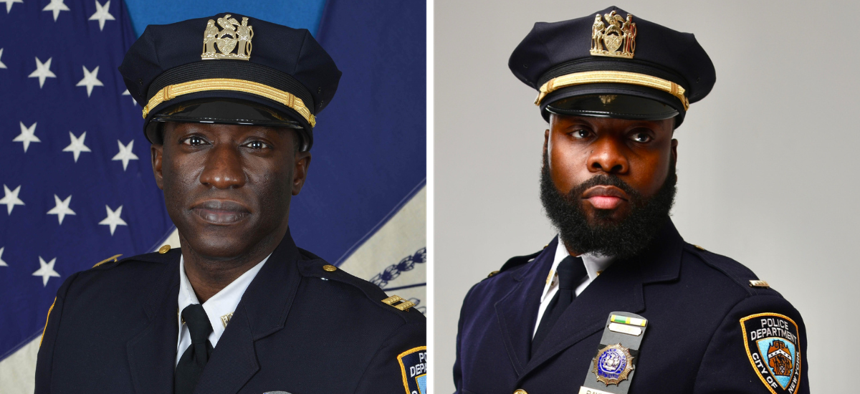Opinion
OPINION: Making a case for diversity of thought in policing
Here’s how to create a police force that truly mirrors the needs and expectations of modern society.

Derby St. Fort and Edwin Raymond (St. Fort by New York Police Department Photo Unit and Raymond by photographer Genius Merisier)
As officers in law enforcement, we’ve grappled with a unique duality. On one hand, we are expected to conform culturally within the system we serve, adhering to long-standing norms and practices. On the other, we are acutely aware of the essential need for continuous improvement in policing, particularly when it comes to serving historically marginalized communities. Born and raised in the heart of New York City, our diverse backgrounds symbolize the progress made toward inclusivity and change. However, what truly distinguishes us as law enforcement officers is our willingness to think differently.
By challenging cultural norms of policing through voicing our opinion on strategies that are not beneficial to communities and offering solutions that are more responsive, we understand that innovation is often born from the courage to question standards of the past. Traditional policing models have often been rooted in convention and long-established norms. Yet, it is when we, as law enforcement officers, challenge these norms, and engage in open dialogues about the effectiveness and impact of these practices that we unbar our minds towards the potential for greater progress.
In the ongoing dialogue surrounding police reform, one aspect that warrants deeper consideration is the need for diversity of thought within law enforcement agencies. While diversity and inclusion initiatives have made strides in increasing the representation of underrepresented communities, there is an equally pressing need to diversify the way police officers think, approach their roles, and engage with the communities they serve.
The call for diversity of thought is not a dismissal of the importance of racial, gender, or ethnic diversity within policing; instead, it is a vital complement to creating a police force that truly mirrors the needs and expectations of modern society. The tragic death of Tyre Nichols , a 29-year-old black man, involving five black officers of the Memphis Police Department, powerfully underscores the idea that racial diversity, while significant, cannot on its own address the deeper challenges in policing, including cultural issues within law enforcement that negatively impact interactions between the police and communities of color.
Diversity of thought within policing can manifest in various ways. It might encompass fostering a culture where officers engage in critical self-reflection, challenge long-standing practices, and explore innovative approaches to problem-solving. Furthermore, it could involve collaborating with community groups and tapping into the expertise of professionals in psychology, sociology, and social work to address intricate community issues. In an era where some argue that our traditional tools for problem-solving have been diminished, it is imperative to recognize these resources as fresh instruments for adapting to the demands of the present times. Embracing this array of perspectives and collaborative strategies is essential for law enforcement to effectively navigate the ever-evolving challenges and complexities of the modern era.
One crucial aspect of diversifying thought is the role of training and education. Broadening the education offered to those entering the law enforcement profession can be highly beneficial in elevating the comprehensive understanding of policing and safety. This may include exploring alternative public safety models that prioritize addressing issues from a supportive perspective, rather than relying solely on punitive approaches. Furthermore, officers should gain insightful
knowledge about the intricate relationship between public health and the overall safety of communities. By cultivating this comprehensive knowledge base, officers become better equipped to navigate the intricate dynamics of modern society effectively. This approach not only fosters a safer environment but also promotes thriving communities through enhanced understanding and cooperation.
A diversified police force that welcomes diversity of thought is better equipped to handle the myriad challenges it faces in the 21st century. Through strategic collaboration, it can navigate issues such as mental health crises, homelessness, and substance abuse, with a more empathetic, solution-oriented approach. It can proactively engage with community organizations, build trust, and focus on preventative strategies.
However, achieving diversity of thought in policing requires a cultural shift within law enforcement agencies. It necessitates justice-minded leadership committed to these ideals and the eradication of any systemic barriers that may stifle the expression of varying perspectives.
The path to reform in policing requires more than just the recruitment of diverse officers. It demands an environment that encourages and values diversity of thought. It is only through this leading edge approach that law enforcement can evolve to meet the complex needs of our ever-changing society. As we envision a more equitable and just future, diversity of thought in policing should be at the forefront of our reform efforts.
Edwin Raymond is a retired lieutenant with the New York Police Department, whistleblower, activist, and author. Derby St.Fort is an active NYPD captain, police reform advocate and a proponent of alternative public safety models.